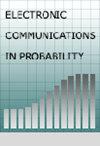最不利噪声的存在
IF 0.5
4区 数学
Q4 STATISTICS & PROBABILITY
引用次数: 0
摘要
假设观察到一个感兴趣的随机变量$X$。本文关注的是“最不利噪声”$\hat{Y}_{\epsilon}$,它在$Y$类中使预测误差$E [X - E[X|X+Y]]^2 $最大化(或使方差$E[X| X+Y]$最小化),而$Y$独立于$X$和$\mathrm{var} Y \leq \epsilon^2$。这个问题最早是由恩斯特、卡根和罗杰斯(b[3])研究的。在本文中,我们证明了最不利噪声$\hat{Y}_{\epsilon}$必须存在,其方差必须为$\epsilon^2$。存在性的证明依赖于我们为条件期望的方差开发的收敛结果。进一步,我们证明了函数$\inf_{\mathrm{var} Y \leq \epsilon^2} \, \mathrm{var} \, E[X|X+Y]$在$\epsilon$中既是严格递减的又是右连续的。本文章由计算机程序翻译,如有差异,请以英文原文为准。
The existence of the least favorable noise
Suppose that a random variable $X$ of interest is observed. This paper concerns"the least favorable noise"$\hat{Y}_{\epsilon}$, which maximizes the prediction error $E [X - E[X|X+Y]]^2 $ (or minimizes the variance of $E[X| X+Y]$) in the class of $Y$ with $Y$ independent of $X$ and $\mathrm{var} Y \leq \epsilon^2$. This problem was first studied by Ernst, Kagan, and Rogers ([3]). In the present manuscript, we show that the least favorable noise $\hat{Y}_{\epsilon}$ must exist and that its variance must be $\epsilon^2$. The proof of existence relies on a convergence result we develop for variances of conditional expectations. Further, we show that the function $\inf_{\mathrm{var} Y \leq \epsilon^2} \, \mathrm{var} \, E[X|X+Y]$ is both strictly decreasing and right continuous in $\epsilon$.
求助全文
通过发布文献求助,成功后即可免费获取论文全文。
去求助
来源期刊

Electronic Communications in Probability
工程技术-统计学与概率论
CiteScore
1.00
自引率
0.00%
发文量
38
审稿时长
6-12 weeks
期刊介绍:
The Electronic Communications in Probability (ECP) publishes short research articles in probability theory. Its sister journal, the Electronic Journal of Probability (EJP), publishes full-length articles in probability theory. Short papers, those less than 12 pages, should be submitted to ECP first. EJP and ECP share the same editorial board, but with different Editors in Chief.
 求助内容:
求助内容: 应助结果提醒方式:
应助结果提醒方式:


